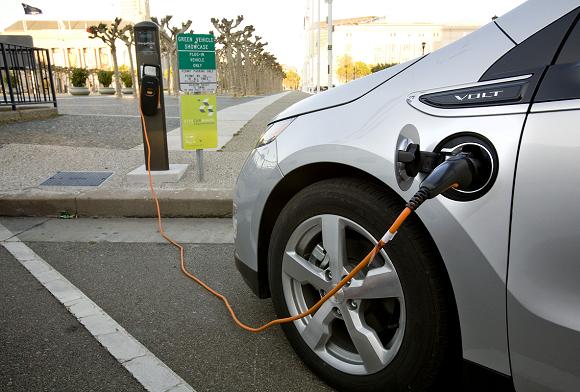Why are there only 330,000 electric cars on US roads?
Five years after President Obama called for one million electric vehicles to be on US roads by 2015 the figure is stuck at 330,000, and there are suggestions that it is car dealers who are standing in the way
Five years ago, in his State of the Union address, President Obama called for one million electric vehicles to be on US roads by 2015. However, at the close of the year, there were only 330,000. Environmentalists promote their ability to cut dangerous emissions. Apple and Google are both in the electric race. And last year, Tesla significantly extended its network of charging stations across the US by 200%. So why is electric vehicle take-up proving so slow?
Customer uncertainty
One of the most commonly cited explanations is the limited driving range of electric cars between charges; most models can travel just under 130 kilometres before requiring a charge. Currently, the charging network across the US is incomplete. There are certain charging hubs, such as California, which are very well connected. But country-wide, even with Tesla’s huge boost, the network has gaps. And if consumers can’t be sure that electric cars will be practical and easy to drive, they will not buy them.
There is also strong competition in the market. As the former chairman of the National Automobile Dealers Association, Forrest McConnell, comments: “In 2006, automakers produced 69 high-mileage vehicle choices. Today, they produce 492. We have gas-powered Honda Civics on my dealership lot that can get 40 miles to the gallon [5.8 litres per 100 kilometres]. People used to have to buy a hybrid car to get that kind of mileage.” The electric models are also more expensive, with initial costs at around $75,000, or twice as much as the average non-electric car in the US. The recent drop in gas prices has only served as a further incentive to continue with traditional fuel cars.
Tax breaks and government subsidies on electric cars are also considered important. They have been crucial in the take-up of electric cars, but as soon as they expire, they are equally crucial in the plummeting number of models sold. For example, in Georgia, at the expiration of a 15-year-old tax incentive sales of electric cars dropped 90% (Watchdog.org).
Car dealers blocking electric car take-up
However, another theory has been put forward: car dealers, and their lack of enthusiasm for selling electric cars. In the US, almost all new cars are sold through dealerships, and so car dealers will inevitably play a crucial role in electric car take-up. But a 2014 secret survey by Consumer Reports claims dealers are in fact having a negative effect on electric car sales.
The study reports that many car dealers are not knowledgeable about electric vehicles, with dealers uncertain how far the cars can go on a charge, charging costs, battery life, and battery warranties, along with being uneducated about tax incentives and subsidies. During the study, 13 of the 85 dealerships talked consumers into buying a gas vehicle instead. And 35 of the dealerships recommended a gas vehicle instead. The report cites stories such as a Toyota salesperson in New York who would not show a Prius plug-in that was in stock to the shopper, and a Ford dealer in Manhattan who incorrectly denied the existence of an electric Focus model.

Tesl’a Model S1
What’s holding car dealers back?
McConnell claims that dealers are in fact putting the consumer first. In a speech delivered to dealers in Michigan last summer he commented: “You have to consider the customer’s needs, and some trump fuel economy.” Citing a survey that reports only 14% of buyers say fuel efficiency is the most important factor in buying a car, he argues “that is a nice way of saying that 86 per cent of them didn’t think so”. He continued by saying fuel economy regulations were like “selling broccoli to customers who want low-calorie doughnuts” (with broccoli being electric cars and doughnuts being fuel efficient gas cars). And he may have a valid point. Electric cars are not suitable for every consumer.
The Consumer Report, however, proposes another theory, suggesting that rather than being unwilling to sell electric vehicles, car dealers are being held back from selling them by a lack of knowledge. The report argues dealers push consumers towards cars about which they are better informed and can therefore sell more confidently.
Another plausible argument is that of the bottom line: electric cars do not offer dealers the same profits as gas cars. Electric vehicles take longer to sell as dealers must explain the new technology and the different driving feel. And they require less maintenance once bought, which cuts into after-sale services which are a significant source of income for dealerships. Marc Deutsch, Nissan’s business development manager for electric vehicles, comments: “A salesperson can sell two gas burners in less than it takes to sell a Leaf. It’s a lot of work for a little pay.”
Although this all paints a rather negative picture, it doesn’t mean that electric cars won’t enjoy mainstream success one day. But a significant amount of education will be required to tackle the poor knowledge of both consumers and car dealers, as will an improved charging network and more cost-effective cars. In March of this year, Tesla hopes to take a step in that direction with the release of its new, smaller, cheaper Model 3, which will cost around $35,000 before any incentives. And hopefully this model can take us closer to meeting President Obama’s call for one million electric vehicles on US roads.















There are no comments
Add yours